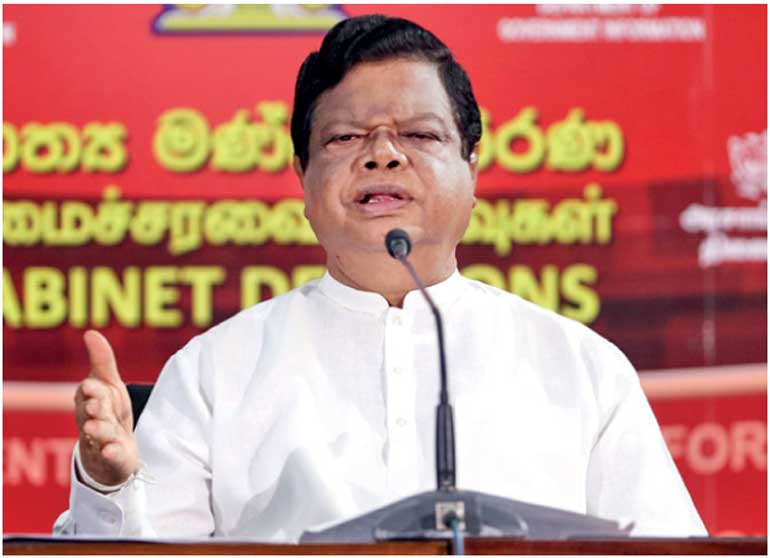Saturday Feb 21, 2026
Saturday Feb 21, 2026
Wednesday, 14 June 2023 00:20 - - {{hitsCtrl.values.hits}}

Cabinet Spokesman and Mass Media Minister Bandula Gunawardena
The Government yesterday assured that the proposed Broadcasting Regulatory Act will not be used to suppress media outlets or media freedom in the country.
“The aim is to create a more developed media culture in the country. A proper system that meets international standards needs to be created,” Cabinet Spokesman and Mass Media Minister Bandula Gunawardena said at the post-Cabinet meeting media briefing yesterday.
Noting that as the Minister in charge, he is empowered to issue and terminate licenses issued to broadcasters, he will never engage in such an Act.
“There was a time when it was possible to charge journalists in the court under the criminal law for defamation, and President Ranil Wickremesinghe lifted those conditions. He (President) was heavily criticised for doing so,” he said.
Gunawardena said if reasonable changes are put forward, the Government will consider necessary amendments be made to the proposed Broadcasting Regulatory Act.
“Regulatory Act is still in the draft stage,” he asserted.
The Sinhala version of the proposed document is now available for the broadcasters for their perusal, as they had previously highlighted on the English version of the document was available.
The Broadcasting Regulatory Commission is to be introduced via a new piece of legislation. The Cabinet-appointed sub-committee, led by Justice Minister Wijeyadasa Rajapakshe completed the drafting of the legislation establishing a ‘Broadcast Authority’ for the creation of a Broadcasting Regulatory Commission.
Upon the recommendations of the committee, the Broadcasting Regulatory Commission may cancel, suspend or impose a fine on the license issued to the broadcasting entity.
In addition to the violation of any clause of the Broadcasting Regulatory Commission Act, the Commission can also decide on the license issued to a broadcasting entity, if it had broadcasted anything that may create a threat to national security, economy, or conflict among races or religions.
It notes that any person who fails to comply with any direction or recommendation issued by the commission or refuses to cooperate, shall be guilty of an offence and shall on conviction after a summary trial before a Magistrate be liable to a fine or imprisonment, or both.
It proposes the establishment of a Broadcasting Regulatory Commission consisting of five members, the commission will appoint its investigating committee.
If news reports detrimental to national security, national economy, and public order are published by broadcasters, the Broadcasting Regulatory Commission will be able to revoke and temporarily suspend the license of the broadcaster.
In addition, the Investigating Committee of the Broadcasting Regulatory Commission will have the power to obtain a court order and raid media institutions.
If the proposed legislation is passed in its original form, a complaint will not even be ‘necessary’ to launch an investigation on a media institution.
The Broadcasting Regulatory Commission will also be empowered to formulate codes of conduct to be followed by the broadcasting entities or persons in consultation with the licensed broadcasters.